"They all saw Him and were terrified. But immediately He spoke with them and said to them, 'Take courage; it is I, do not be afraid.'" (Mark 6:50) This article is the second in a series on the "'Fear Nots' of the Bible." The first article presented the "'Fear Nots' of the Old Testament" (Ref. 1). In the Old Testament, God assured the Israelites, "Fear not, for I am with you" (Isaiah 41:10). Moses encouraged the Israelites about the Lord's presence with them, "Do not be afraid or tremble at them, for the Lord your God is the one who goes with you. He will not fail you or forsake you" (Deuteronomy 31:6). This article presents statements of Jesus where he tells us to "Fear not" or "Do not be afraid." Jesus Christ, the Son of God, assures those who believe in him and follow him that we have no reason to fear. Consider. In what areas of your life are you afraid? With what circumstances or trials would you like Jesus to give you courage and peace? Definition of Fear Unless indicated otherwise, the verses in this article use the Greek word phobeó for fear or afraid (Ref. 2). The New Testament uses phobeó to mean put to flight (withdraw from), terrify, frighten, dread, or reverence (Ref. 2). Jesus Gives Us Courage in the Midst of Our Trials Recall the event when Jesus walked on the water of Lake Galilee late at night to come to his disciples who were struggling with rowing against the wind (read here, Mark 6:45-52). In Mark 6:48 the Greek language uses a serious word to describe the disciple's situation. The New American Standard Bible says the disciples were straining at the oars for the wind was against them. The Greek word for straining is basanizó, which means a tormenting trial, to examine by using torture (Ref. 3). Wow. Jesus took the initiative and came to his disciples during their tormenting trial at sea (Mark 6:48). The disciples saw Jesus approaching, but did not recognize him at first. They thought he was a ghost, and they were frightened (Mark 6:49-50). Jesus said to them, and he says to us in our trial, "Take courage; it is I, do not be afraid" (Mark 6:50). The Greek word for courage is tharseó, which means emboldened from within (Ref. 4). For the believer, bold courage is infused by the Lord and means "living out the inner confidence (inner bolstering) that is Spirit-produced" (Ref. 4). By faith, Jesus gives us courage (inner boldness and confidence) during our trials. His presence with us calms our storms (Mark 6:51, Mark 4:38-39). Believing in Jesus is the Remedy for Our Fear A synagogue official named Jairus came to Jesus and urgently asked Jesus, "My little daughter is at the point of death; please come and lay Your hands on her, so that she will get well and live" (Mark 5:22-23). While on the way, bad news came from the house of the synagogue official. "Your daughter has died; why trouble the Teacher anymore?" (Mark 5:35). Jesus disagreed with the advice of the bad news bearer to not trust further in Jesus. Jesus immediately said to Jairus, "Fear not, only believe" (Mark 5:36). In the face of bad news, believing in (trusting in, having faith in) Jesus is the only remedy for our grief and fear (Ref. 5, Ref. 6). Jesus knew that he "had things under control." Jairus only needed to believe. Jesus went on to raise Jairus' daughter from the dead (Mark 5:40-42). God Knows Us, Values Us, and Cares for Us Jesus said, "Are not two sparrows sold for a copper coin? And not one of them falls to the ground apart from your Father’s will. But the very hairs of your head are all numbered. Do not fear therefore; you are of more value than many sparrows" (Matthew 10:29-31). English Theologian John Gill (1697 - 1771) wrote, "If God takes care of sparrows and is concerned for their lives, much more will he take care of his faithful ministers, and not suffer their lives to be taken away, till they have done the will and work of their Lord" (Ref. 7, Ref. 8). Jesus Gives Give Us Peace that the World Cannot Give On the evening before his death, Jesus said to his disciples, "Peace I leave with you; My peace I give to you; not as the world gives do I give to you. Do not let your heart be troubled, nor let it be fearful" (John 14:27). Jesus gives his disciples peace. The peace that Jesus gives dispels our fear. The Greek word for peace in John 14:27 is eiréné. Eiréné (peace) is God's gift of wholeness including peace of mind (Ref. 9). The invocation of peace (shalom in Hebrew) also was a common Jewish farewell, in the Hebraistic sense of the health (welfare), security, safety, and prosperity of an individual (Ref. 10, 1 Samuel 1:16-18, 1 Samuel 20:42). The Greek word for fear in John 14:27 is deiliaó, which means to be cowardly (Ref. 11). Deiliaó is used only this one time in the New Testament. Jesus' presence and his words bring comfort, courage, and peace to his disciples then and now. Apply. If you do not yet know Jesus, put your faith and trust in him. Believing in Jesus is the only remedy for your fear. If you do know Jesus, and you are going through a difficult time, pray, and put your trust in Jesus. He will provide you the comfort, courage, and peace that you seek. References
1. http://www.ScriptureWay.com/home/fear-nots-of-the-old-testament 2. https://biblehub.com/greek/5399.htm 3. https://biblehub.com/greek/928.htm 4. https://biblehub.com/greek/2293.htm 5. https://biblehub.com/greek/4100.htm 6. https://biblehub.com/commentaries/mhc/mark/5.htm 7. https://biblehub.com/commentaries/gill/matthew/10.htm 8. https://en.wikipedia.org/wiki/John_Gill_(theologian) 9. https://biblehub.com/greek/1515.htm 10. https://biblehub.com/hebrew/7965.htm 11. https://biblehub.com/greek/1168.htm
0 Comments
"I will ask the Father, and He will give you another Helper, that He may be with you forever; that is the Spirit of truth, whom the world cannot receive, because it does not see Him or know Him, but you know Him because He abides with you and will be in you." (John 14:16-17) This lesson is the fifth and final lesson in the series on "Christians and the World" (Ref. 1, Ref. 2, Ref. 3, Ref. 4). This lesson describes the role of the Holy Spirit that Jesus promised to give to his disciples who will be living in the world. Consider. How did the Holy Spirit help the disciples of Jesus in an unfriendly world? How does the Holy Spirit help you? Let's set the stage. Jesus the Son of God and his disciples had walked together for three years. They had left homes, families, and businesses to follow him. Jesus had led them while he was with them. Jesus had loved them and instructed them. Jesus had sent the twelve and the seventy on training missions to proclaim the kingdom of God and heal the sick (Luke 9:1-2, Luke 10:1-2). Now it is the last evening before Jesus' crucifixion and death. When the scene unfolds in John chapter 14 Jesus is preparing his disciples for his departure. He has told his disciples that he is about to leave them (John 13:33). Jesus tells them that he is going to the Father's house to prepare a place for them and that he would come again to receive them to himself (John 14:2-3). Jesus knows that he will be leaving the disciples in an unfriendly world. He explains that he will ask the Father, and the Father will give them another Helper to be with them. "I will ask the Father, and He will give you another Helper." The Greek word for Helper in John 14:16 is paraklétos (Ref. 5). Paraklétos means one called alongside to help (Bible Gateway note, Ref. 6). The King James Version translates paraklétos as Comforter in John 14:16. Paraklétos occurs five times in the New Testament, all in the writings of John - John 14:16, John 14:26, John 15:26, John 16:7, and 1 John 2:1. Titles for the Paraclete include Advocate (1 John 2:1), Comforter, Helper, Spirit of Truth (John 14:17, John 16:13) and the Holy Spirit (John 14:26). The work of the Holy Spirit applied to Jesus' disciples then, to the early church, and to those who believe in and follow Jesus today. The work of the Holy Spirit includes: 1. Comforting, encouraging, and strengthening us. Luke the physician wrote about the comfort of the Holy Spirit in the early church. "So the church throughout all Judea and Galilee and Samaria enjoyed peace, being built up; and going on in the fear of the Lord and in the comfort of the Holy Spirit, it continued to increase" (Acts 9:31). The Apostle Paul wrote about the role of the Holy Spirit to the believers at Ephesus (Ephesians 1:1). "For this reason I bow my knees before the Father, from whom every family in heaven and on earth derives its name, that He would grant you, according to the riches of His glory, to be strengthened with power through His Spirit in the inner man ..." (Ephesians 3:14-16, italics added). 2. Teaching us and guiding us into all the truth. Jesus told his disciples that the Helper "will teach you all things" (John 14:26). Jesus also said, "When He, the Spirit of Truth, comes, He will guide you into all the truth" (John 16:13). John wrote that the Holy Spirit helps us to discern truth and error (1 John 4:1, 6). For more information about the Spirit of Truth, please refer to the lesson, "Spirit of Truth" (Ref. 7). 3. Empowering us for service and witness. Jesus told his disciples before his ascension and departure, "You will receive power when the Holy Spirit has come upon you; and you shall be My witnesses both in Jerusalem, and in all Judea and Samaria, and even to the remotest part of the earth" (Acts 1:8). Jesus also told his disciples that the Holy Spirit would give them words to speak when they encountered arrest and persecution in the hostile world. "When they arrest you and hand you over, do not worry beforehand about what you are to say, but say whatever is given you in that hour; for it is not you who speak, but it is the Holy Spirit" (Mark 13:11). "That He may be with you forever." Jesus was with his disciples for a few years. He was about to separate from them. He would come to them again in the form of the Paraclete (Holy Spirit), and this spiritual presence would remain with them and future disciples forever (Matthew 28:19-20). For those whose love Christ and keep his commandments, the Holy Spirit is our constant guide, companion, and gift giver, even to the end of the world. "Whom the world cannot receive." Jesus said, "... the Spirit of truth, whom the world cannot receive, because it does not see Him or know Him ..." (John 14:17). The Greek word for see is theóreó, which means to look at, gaze, discern (Ref. 8). The Greek word for know is ginóskó, which means to know through personal experience (Ref. 9). The world has no eyes with which it can see and no heart to know spiritual things so it cannot receive its (the Holy Spirit's) presence and power (Thayer's Greek Lexicon, Ref. 8). The Apostle Paul wrote, "The person without the Spirit does not accept the things that come from the Spirit of God but considers them foolishness, and cannot understand them because they are discerned only through the Spirit" (1 Corinthians 2:14). "You know Him because He abides with you and will be in you." God provides the gift of the Holy Spirit to all persons who believe in (trust in, put their faith in) Jesus Christ. Jesus spoke of the future coming of Spirit to believers. "If anyone is thirsty, let him come to Me and drink. He who believes in Me, as the Scripture said, 'From his innermost being will flow rivers of living water.' But this He spoke of the Spirit, whom those who believed in Him were to receive; for the Spirit was not yet given, because Jesus was not yet glorified" (John 7:37-39). On the day of Pentecost, the Holy Spirit came to fill and empower the disciples of Jesus (Acts 2:1-4). The Apostle Peter provided a Holy Spirit-inspired sermon (Acts 2:14-36). Peter concluded his sermon with this call to action, "Repent, and each of you be baptized in the name of Jesus Christ for the forgiveness of your sins; and you will receive the gift of the Holy Spirit. For the promise is for you and your children and for all who are far off, as many as the Lord our God will call to Himself' " (Acts 2:38-39, italics added). God provides the same gift of the Holy Spirit to believers today when we trust in and follow Jesus Christ. Apply. Jesus said that he would send the Holy Spirit to those who believe in him (John 7:39). Have you received the gift of the Holy Spirit (Acts 2:38-39)? How is the Holy Spirit helping you to live in an unfriendly world? Related Lessons "Do Not Love the World" (1 John 2:15) "The World Hates Jesus and His Disciples" (John 7:7, John 15:18-19) "God's Offer of Salvation and Eternal Life" (John 3:16-17) "Biblical Definition of the World" (John 1:10) References
1. http://www.ScriptureWay.com/home/biblical-definition-of-the-world 2. http://www.ScriptureWay.com/home/the-most-important-offer-you-will-ever-receive 3. http://www.ScriptureWay.com/home/the-world-hates-jesus-and-his-disciples 4. http://www.ScriptureWay.com/home/do-not-love-the-world 5. https://biblehub.com/greek/3875.htm 6. https://www.biblegateway.com/passage/?search=John+14%3A16&version=NASB 7. http://www.ScriptureWay.com/home/the-spirit-of-truth 8. https://biblehub.com/greek/2334.htm 9. https://biblehub.com/greek/1097.htm
“For God so loved the world, that He gave His only begotten Son, that whoever believes in Him shall not perish, but have eternal life. For God did not send the Son into the world to judge the world, but that the world might be saved through Him." (John 3:16-17)
This lesson is the second in the series on "Christians and the World." This lesson focuses on God's offer of salvation and eternal life to the world through Christ.
Consider. Have you heard of God's offer of salvation and eternal life through his Son Jesus Christ? Have you accepted God's offer?
What is God's Offer?
God offers the world salvation and eternal life through his Son Jesus. John 3:16-17 tells us, "For God so loved the world, that He gave His only begotten Son, that whoever believes in Him shall not perish, but have eternal life. For God did not send the Son into the world to judge the world, but that the world might be saved through Him."
To Whom Does God Make the Offer?
God offers salvation and eternal life to all the people of the world. There are no exclusions. There is no "asterisk." There is no asterisk that says you are excluded from God's offer because you are * (fill in the asterisk). The Apostle Paul wrote that God "desires all people to be saved and to come to the knowledge of the truth" (1 Timothy 2:3-4). God's offer is available to you.
Even though God has made salvation and eternal life available to the world, not all people will be saved. Some people hear God's offer and reject it. Some people have not heard the gospel message; however, they reject what God has revealed to them already through the creation. "That which is known about God is evident within them; for God made it evident to them. For since the creation of the world His invisible attributes, His eternal power and divine nature, have been clearly seen, being understood through what has been made, so that they are without excuse" (Romans 1:19-20). God has promised that all who seek him will find him (Deuteronomy 4:29). Why Does God Make the Offer of Salvation and Eternal Life?
Because God loves the world. God loves all the inhabitants of the world including people who do not know and love Christ and people who are hostile to Christ (John 3:16, Ref. 2).
God sent his Son Jesus because of God's divine love for the world. Even though mankind has sinned against God, disobeyed God, and turned away from God, God still has loved us. The Apostle Paul wrote, "But God demonstrates His own love toward us, in that while we were yet sinners, Christ died for us" (Romans 5:8). John, Jesus' disciple, wrote, "In this is love, not that we loved God, but that He loved us and sent His Son to be the propitiation for our sins" (1 John 4:10). The word, propitiation, means atoning sacrifice (Ref. 3). Why is God's Offer of Salvation and Eternal Life Necessary?
Because through Adam, sin has come into the world and infects all people. Romans 5:12 tells us, "Therefore, just as through one man sin entered into the world, and death through sin, and so death spread to all men, because all sinned." Without the treatment of Christ, the infectious disease of sin is fatal. That is why we need a Savior.
What is the Salvation that God Offers?
John 3:17 tells us, "For God did not send the Son into the world to judge the world, but that the world might be saved through Him." The Greek word for saved in John 3:17 is sózó. Sózó means deliver out of danger and into safety; used principally of God rescuing believers from the penalty and power of sin – and into His provisions (safety) (Ref. 4). Ref. 5 defines salvation as "The deliverance, by the grace of God, from eternal punishment for sin which is granted to those who accept by faith God’s conditions of repentance and faith in the Lord Jesus."
What is the Eternal Life that God Offers?
Eternal life is a free gift of God to those who believe in Jesus Christ (Romans 6:23). Eternal life begins when we put our faith in Jesus. As believers in Christ, eternal life continues with God after our physical death (John 11:25-26). Eternal life is the quality of life that results when we know Jesus Christ by experience, on a first-hand basis (John 17:3). For further information about eternal life, refer to "What is Eternal Life?" (Ref. 6)
What is the Role of Jesus Christ in God's Offer?
God sent His Son Jesus to give his life sacrificially to pay the penalty for our sin. "And according to the Law, one may almost say, all things are cleansed with blood, and without shedding of blood there is no forgiveness" (Hebrews 9:22). By paying the penalty for our sin with his life blood, Jesus has redeemed those who believe in (trust in and have faith in) him. The Apostle Peter wrote, "You were not redeemed with perishable things like silver or gold from your futile way of life inherited from your forefathers, but with precious blood, as of a lamb unblemished and spotless, the blood of Christ" (1 Peter 1:18-19).
God's Offer of Salvation and Eternal Life is Conditional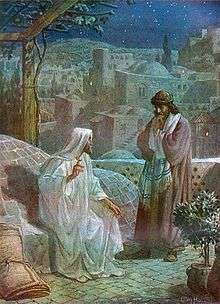 Jesus and Nicodemus (Ref. 7) Jesus and Nicodemus (Ref. 7)
Even though God unconditionally loves the world, there is one condition that God stipulates for mankind to accept his offer of salvation and eternal life - believing in (trusting in, having faith in) his Son Jesus. Jesus said to Nicodemus, "For God so loved the world, that He gave His only begotten Son, that whoever believes in Him shall not perish, but have eternal life" (John 3:16, John 3:1-2).
Is there a Penalty for Rejecting God's Offer?
Yes. The Bible tells us, "For God did not send the Son into the world to judge the world, but that the world might be saved through Him. He who believes in Him is not judged; he who does not believe has been judged already, because he has not believed in the name of the only begotten Son of God" (John 3:17-18). Jesus also stated, "Truly, truly, I say to you, he who hears My word, and believes Him who sent Me, has eternal life, and does not come into judgment, but has passed out of death into life" (John 5:24).
Why is God's Offer the Most Important Offer You Will Ever Receive?
Unlike what the world offers, God's offer of salvation and eternal life results in eternal life-giving benefits when you accept God's offer by believing in Jesus.
Apply. God offers you salvation and eternal life through his Son, Jesus Christ (John 3:16-17). Have you already accepted the most important offer that you will ever receive? If yes, then praise God. If not, will you accept God's offer by thanking Jesus for forgiving your sins and then fully trusting in him by faith today?
Related Lessons
"What Does 'To Be Saved" Mean in the Old Testament?" (Psalm 18:3) "What Does 'To Be Saved' Mean in the New Testament?" (Acts 16:31) "What is Eternal Life?" (John 17:3) "Biblical Definition of the World" (John 1:10)
References
1. Ref.1 begins on the next line https://americanart.si.edu/artwork/study-christ-and-nicodemus-rooftop-23686 2. http://www.ScriptureWay.com/home/biblical-definition-of-the-world 3. https://biblehub.com/greek/2434.htm 4. https://biblehub.com/greek/4982.htm 5. https://www.gotquestions.org/Christian-doctrine-salvation.html 6. http://www.ScriptureWay.com/home/what-is-eternal-life 7. https://en.wikipedia.org/wiki/Nicodemus
"I am the Alpha and the Omega," says the Lord God, "who is and who was and who is to come, the Almighty." (Revelation 1:8)
"When I saw Him, I fell at His feet like a dead man. And He placed His right hand on me, saying, 'Do not be afraid; I am the first and the last, and the living One; and I was dead, and behold, I am alive forevermore, and I have the keys of death and of Hades.' " (Revelation 1:17-18)
"Behold, I am coming quickly, and My reward is with Me, to render to every man according to what he has done. I am the Alpha and the Omega, the first and the last, the beginning and the end." (Revelation 22:12-13)
This lesson is the seventh and final in the series on the "I AM" statements of Christ. Today's lesson discusses Jesus' statements, "I am the Alpha and the Omega" and "I am the first and the last."
Consider. Jesus said, "Do not be afraid, I am the first and the last, and the living One" (Revelation 1:17-18). Consider these comforting words.
Revelation Defined
The writer begins, "The Revelation of Jesus Christ, which God gave Him to show to His bond-servants, the things which must soon take place; and He sent and communicated it by His angel to His bond-servant John ..." (Revelation 1:1). The Greek word for revelation is apokalupsis. Apokalupsis means uncovering or unveiling of truth and divine things previously unknown (Ref. 1). The One who is providing the revelation of things to come is Jesus Christ. The Apostle John is the writer, Jesus Christ the author, of the book (Ref. 2).
"I am the Alpha and the Omega."
Revelation 1:8 begins with the words, "I am." The words "I am" refer to the name of God. When God appeared to Moses in the burning bush, Moses asked God his name. God said to Moses, "I AM WHO I AM" (Exodus 3:13-14). Then God said, "Thus you shall say to the sons of Israel, 'I AM has sent me to you' " (Exodus 3:14). Jesus used the same language in John 8:58, "Truly, truly, I say to you, before Abraham was born, I am." Jesus, the speaker of "I am the Alpha and the Omega" in Revelation 1:8, is the same God who appeared visibly to Moses in the burning bush and said "I AM WHO I AM." Jesus used the same "I am" language when he spoke "I am the light of the world" (John 8:12) and his other "I AM" statements we have studied in this series. For more information about who Jesus is, click on "Who is Jesus?" - Ref. 3. To see a list of the "I AM" statements of Christ, click on Ref. 4.
Alpha (Α) is the first letter, and Omega (Ω) is the last letter in the Greek alphabet. The use of these letters signifies that Christ is the first and last (Ref. 5). In Revelation 22:13, Jesus says, "I am the Alpha and the Omega, the first and the last, the beginning and the end." The language in these verses denotes eternity in the being to whom it is applied (Ref. 6). That language can be used only in reference to the true God. "It means that he is the beginning and the end of all things; that he was at the commencement, and he will be at the close" (Ref. 6). "Do not be afraid, I am the first and the last."
Jesus appeared to John in a vision when John was on the island of Patmos (Revelation 1:9-16). John describes the being that he sees as one "like a son of man" (Revelation 1:13). "His face was like the sun shining in its strength" (Revelation 1:16). In the vision, Jesus said to John, "Do not be afraid; I am the first and the last, and the living One; and I was dead, and behold, I am alive forevermore, and I have the keys of death and of Hades" (Revelation 1:17-18).
Jesus' statement in Revelation 1:17 makes the divine claim, "I am the first and the last." Think about who Jesus is stating he is when he says "I am the first and the last." Read these divine claims in Isaiah:
When Jesus spoke to John in Revelation 1:17, he placed his right hand on John and comforted John with the words, "Do not be afraid; I am the first and the last." The words, "Do not be afraid," are translated as "Fear not" in the King James Version (Revelation 1:17 KJV). "Fear not" is Jesus' comforting message to us. We are to fear not, that is, not be afraid, because for those who believe in Jesus, there is life beyond the grave. Jesus said, "I am he that liveth, and was dead; and, behold, I am alive for evermore, Amen; and have the keys of hell and of death" (Revelation 1:18 KJV).
Apply. Jesus said, "Do not be afraid, I am the first and the last, and the living One" (Revelation 1:17-18). Believe that Jesus is who he says he is. Put your faith and trust in him. Receive the comfort and assurance that only Jesus provides.
References
1. https://biblehub.com/greek/602.htm 2. https://biblehub.com/commentaries/pulpit/revelation/1.htm 3. http://www.ScriptureWay.com/home/who-is-jesus 4. http://www.ScriptureWay.com/bible-verses-i-ams-of-christ 5. https://biblehub.com/commentaries/gill/revelation/1.htm 6. https://biblehub.com/commentaries/barnes/revelation/1.htm
Updated 3 July 2024
Photo source: FreeBibleImages.org
"Jesus said to her, 'I am the resurrection and the life; he who believes in Me will live even if he dies, and everyone who lives and believes in Me will never die. Do you believe this?' " (John 11:25-26)
Consider. Do you believe in Jesus, and do you believe that you will live in him even after your physical death?
This lesson discusses Job's question, "If a man dies, will he live again?," (Job 14:14), and Jesus' answer, "I am the resurrection and the life; he who believes in Me will live even if he dies" (John 11:25).
The scriptures quoted in this lesson are from the New American Standard Bible, 1995 version, unless noted otherwise (Ref. 1).
Job's Question - "If a man dies, will he live again?"
Job asked, "If a man dies, will he live again? All the days of my struggle I will wait until my change comes" (Job 14:14). Job looked forward to a future time when he would be changed and revived from death. The Hebrew word for change in Job 14:14 is chaliphah (pronounced as khal-ee-faw'). Chaliphah means a change of garments (Genesis 45:21-22) as well as revival after death (Job 14:14, Ref. 2).
Job also believed that in a future time in the flesh he would see God. "As for me, I know that my Redeemer lives, and at the last He will take His stand on the earth. Even after my skin is destroyed, Yet from my flesh I shall see God" (Job 19:25-26). Jesus' Answer - "I Am the Resurrection and the Life"
John, the disciple of Jesus, wrote in John 11:1-5 about Jesus receiving news his friend Lazarus was sick. Jesus waited two more days (John 11:6), and then he took his disciples to Bethany, the village of Mary, Martha, and Lazarus (John 11:1). Jesus knew before he traveled to Bethany that Lazarus already was dead (John 11:14).
When Jesus came to Bethany, Martha came out to meet him (John 11:20). Martha said to Jesus, "Lord, if You had been here, my brother would not have died" (John 11:21). Jesus assured her, "Your brother will rise again" (John 11:23). Martha replied to Jesus, "I know that he will rise again in the resurrection on the last day" (John 11:24). The Greek word for resurrection in John 11:24-25 is anastasis (pronounced as an-as'-tas-is), which means standing up again, referring to physical resurrection of the body (Ref. 3). Note that Martha believed in a resurrection - as a future event. Believe in Jesus - Receive Eternal Life
Jesus then turned his discussion with Martha to the present. Jesus told Martha, and these words assure us today -- "I am the resurrection and the life; he who believes in Me will live even if he dies, and everyone who lives and believes in Me will never die. Do you believe this?" (John 11:25-26).
Job's question was, "If a man dies, will he live again?" (Job 14:14). Jesus answered Job's question in the affirmative (yes) and with a promise. Jesus' promise is that when you believe in (trust in, have faith in) him you will live even after your physical death (Ref. 4). Jesus is referring to the eternal life of our soul and spirit which begins during this earthly life when we believe in him, and that eternal life continues with Jesus after our physical death ("What is Eternal Life"- Ref. 5).
Apply. Jesus said to Martha, "I am the resurrection and the life; he who believes in Me will live even if he dies, and everyone who lives and believes in Me will never die" (John 11:25-26). Then Jesus asked Martha, "Do you believe this?" ... (pause) Do you believe this?
Related Lessons and Resources
"What is Eternal Life?" (John 17:3) "Bible Verses About Eternal Life" "Made Alive Together with Christ - A New Quality of Life" (Ephesians 2:45) "Paradise, Jesus, and the Penitent Thief" (Luke 23:42-43)
Photo source: FreeBibleImages.org
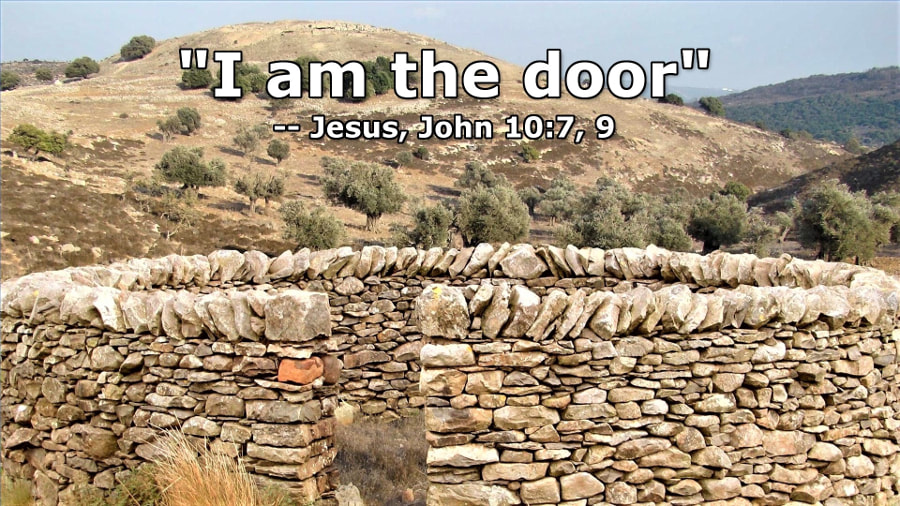
Permanent Sheepfold Enclosure - Holy Land. Photo Copyright David Padfield. Used under license. Permanent sheepfolds were built on the sunny side of valleys where there is protection from cold winds. These had stone walls, 4-5ft high and one entrance guarded by the shepherd. Thorns were often put on the top of walls to deter wild animals. Jesus referred to such a sheepfold and to thieves and robbers climbing over the wall (John 10:1-3).
"So Jesus said to them again, 'Truly, truly, I say to you, I am the door of the sheep.' " (John 10:7, Ref. 1)
"I am the door; if anyone enters through Me, he will be saved, and will go in and out and find pasture." (John 10:9)
"Christ is the Door. And what greater security has the church of God than that the Lord Jesus is between it and all its enemies? ... Here are plain directions how to come into the fold; we must come in by Jesus Christ as the Door." -- Matthew Henry (Ref. 2)
This lesson is the third in a series on the "I AM" statements of Christ. This lesson discusses Jesus' "I am the door" statements in John 10:7 and John 10:9.
Consider. Have you entered into the church of God by believing in the Lord Jesus Christ? Are you experiencing spiritual nourishment in Christ? "If anyone enters through Me" - John 10:9
We enter the sheepfold, the church of God, through Jesus Christ (and only through Jesus Christ). Jesus said, "Truly, truly, I say to you, I am the door of the sheep" (John 10:7). We enter that door when we place our faith and trust in Jesus Christ. "As the only proper way of entering the fold was by the door, so the only way of entering the church of God is by believing on him and obeying his commandments" (Ref. 3).
Jesus said, "I am the way, and the truth, and the life; no one comes to the Father but through Me" (John 14:6). "He will be saved"
Once we have entered the door by faith and trust in Jesus Christ, we are saved. Jesus delivers us from perils such as ravenous wolves and false shepherds (Ref. 4, John 10:1-2). Jesus frees us from the power, guilt, and penalty of sin (Romans 8:1-2, Ephesians 2:1-9). Jesus gives us eternal security. Jesus said, "My sheep hear My voice, and I know them, and they follow Me; and I give eternal life to them, and they will never perish; and no one will snatch them out of My hand" (John 10:27-28).
HELPS Word-Studies defines saved as rescued from destruction and brought into divine safety (Ref. 5). "And will go in and out and find pasture"
To go "in and out" is the common Old Testament expression to denote free activity of daily life (Ref. 6). When Moses charged the Israelites at Mount Gerizim to obey the Lord, he said, "Blessed shall you be when you come in, and blessed shall you be when you go out" (Deuteronomy 28:6, Deuteronomy 27:11-12, Deuteronomy 28:1-2). David wrote about the Lord, the Keeper of Israel (Psalm 121:5). David said, "The Lord will guard your going out and your coming in from this time forth and forever" (Psalm 121:8).
Through Jesus (because he is the door), we have security for our daily needs and nourishment for our souls. Under the care of Jesus, we find pasture - food for our souls (Ref. 7). David wrote, "The Lord is my shepherd; I shall not want. He maketh me to lie down in green pastures: he leadeth me beside the still waters" (Psalm 23:1-2 KJV).
Apply. Have you entered the sheepfold of Christ by believing in him? If not, then put your faith and trust in him today. Are you spending time with Jesus daily to receive spiritual nourishment? How can you improve in this area?
References
1. http://www.ScriptureWay.com/home/when-jesus-said-truly-truly-what-did-he-mean 2. https://biblehub.com/commentaries/mhc/john/10.htm 3. https://biblehub.com/commentaries/barnes/john/10.htm 4. https://biblehub.com/commentaries/pulpit/john/10.htm 5. https://biblehub.com/greek/4982.htm 6. https://biblehub.com/commentaries/egt/john/10.htm 7. https://biblehub.com/commentaries/benson/john/10.htm
"Jesus said to them, 'I am the bread of life; he who comes to Me will not hunger, and he who believes in Me will never thirst.' " (John 6:35)
"Christ shows that he is the true Bread; he is to the soul what bread is to the body." -- Matthew Henry (Ref. 1)
This lesson is the second in a series on the "I AM" statements of Christ. This lesson discusses Jesus' statement, "I am the bread of life" (John 6:35).
Consider. Have you come to Jesus, the Source of sustenance and strength for your spiritual life?
God-provided bread from heaven
Jesus' Jewish listeners knew that God had provided bread from heaven (also called "manna") to the Israelites. "Then the Lord said to Moses, 'Behold, I will rain bread from heaven for you; and the people shall go out and gather a day’s portion every day, that I may test them, whether or not they will walk in My instruction' " (Exodus 16:4). The manna that God provided was essential for the Israelite's survival (Exodus 16:35). Note, however, at that time God did not provide the manna universally to all people. Exodus tells us that God provided the manna only for the Israelites, and the manna was temporary (Exodus 16:35). The people who ate the manna eventually died (John 6:49).
"I am the bread of life"
In contrast with the manna that God provided temporarily to the Israelites, Jesus states emphatically, "I am the bread of life."
"He who comes to Me will not hunger, and he who believes in Me will never thirst"
Before the manna could benefit the Israelites, they had to eat it. In the same way, for Christ to provide us spiritual sustenance and eternal life, we must come to him and believe in him. When we come to Christ and believe in Christ, he alone satisfies the hunger and thirst of our souls (Matthew 5:6, John 7:37).
The Samaritan woman at the well responded to Jesus. She said, "Sir, give me this water, so I will not be thirsty nor come all the way here to draw" (John 4:15). The multitude responded to Jesus when he described the bread of heaven (John 6:33). They said, "Lord, always give us this bread" (John 6:34).
Apply. What is your response to Jesus? Will you come to him and believe in him? Come to him, believe in him, and you will receive the bread of life that your soul craves.
|
Daily Bible Verse(Click the link above) AuthorMr. Whitney V. Myers. Christian. For more information, please visit the Author Page. Posting ScheduleI plan to provide new postings about once a month. Planned Topics(subject to change) Recent Posts(most recent three months) Popular Posts(top 10) Categories
All
Archives
July 2024
|
|
Copyright 2018-2024 Whitney V. Myers |
Listed in Feedspot's Top 100 Bible Study Blogs and Websites |


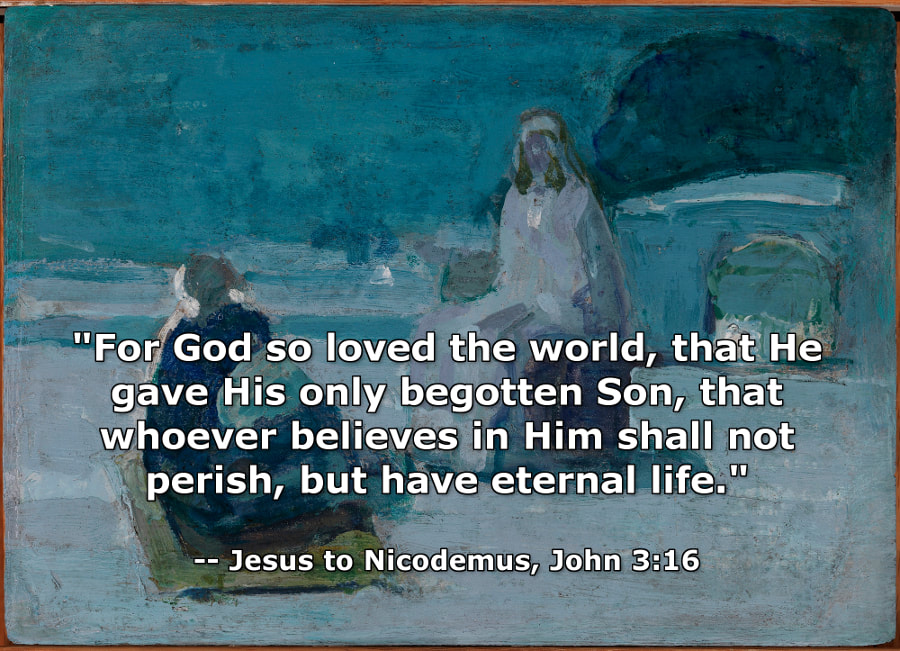

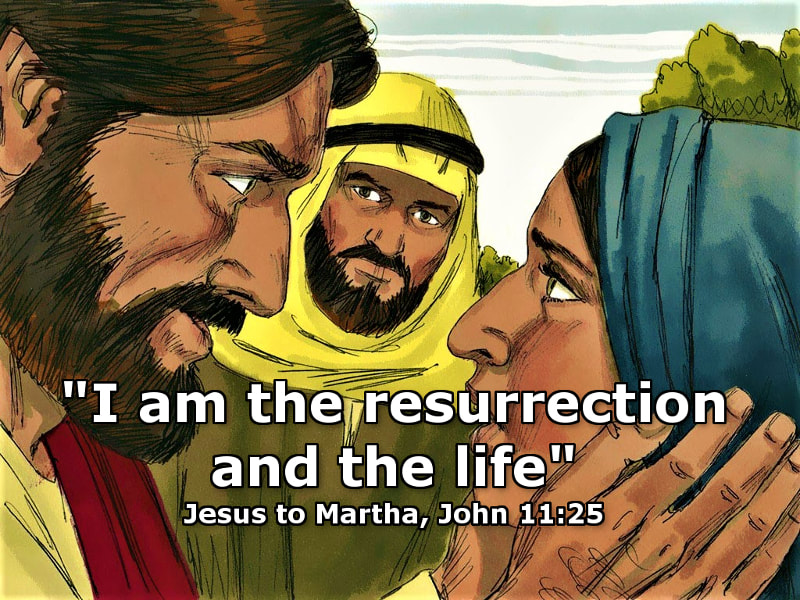
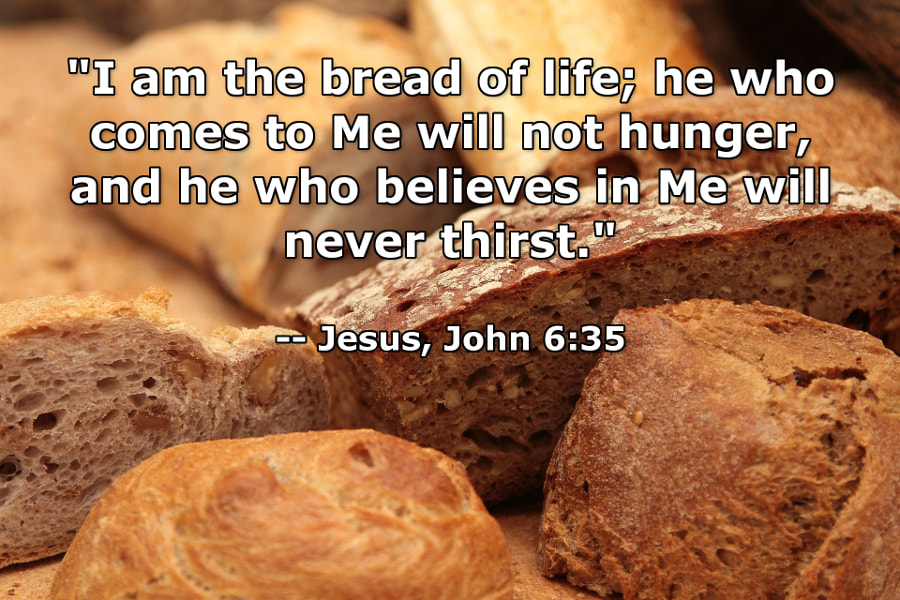
 RSS Feed
RSS Feed
